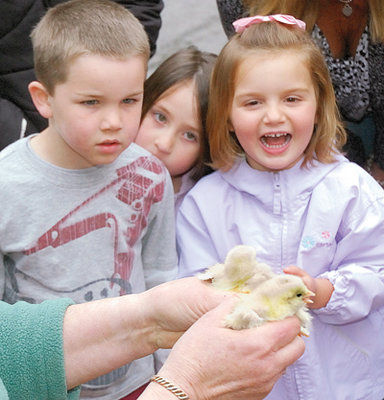
Spring is in the air, and the youngsters from the Early Childhood Learning Center at Bethany University had a chance to experience it firsthand last week.
More than 20 children, parents and teachers from the preschool made a chilly morning visit to Scotts Valley Feed to learn what animals eat from an expert: feed store owner Mike Ritchey.
“Did you know that chicks like to eat oyster shells?” Ritchey asked the fascinated preschoolers as he showed them the varieties of food in the warehouse behind his feed store. The oyster shells provide calcium, necessary for forming strong shells when the chickens begin laying eggs.
Ritchey said the store turns over 80 tons of feed per week, not including numerous bales of hay for many horse owners in the valley.
Ritchey began the tour — organized by Gail Smith from the Early Childhood Learning Center so students could learn about animal care — by showing the children Audrey the duck, a 3-year-old Indian runner who lives at store. Indian runner ducks are a tall, thin variety that runs rather than waddles.
After a walk past cinderblock-sized salt licks and emu food, the group continued on to the spacious alfalfa barn.
Ritchey used several hay hooks and his knee to show the children how a single person can lift a heavy bale of hay high up onto a stack — a technique called “bucking.”
“When life is really good, you have good hay-day,” Ritchey said, explaining the origins of the term.
Ritchey then used the hook to move a bale of hay after one of the young boys lost his shoe between two bales.
Then came the highlight of the morning: a trip to see the peeping chicks that had arrived by postal delivery from New Mexico two days before.
The children were mesmerized by the fuzzy chicks and a yellow duckling that employee Kristen Smith carried outside from the store.
“When they’re noisy, they are cold and hungry,” Ritchey explained. “When they are quiet, they are happy.”
Each child had a chance to touch a chick and watched them tumble over one another. The next day, Ritchey said, all the chicks would be sold to families who wanted to raise chickens. The young birds can begin laying eggs after as few as five months.












